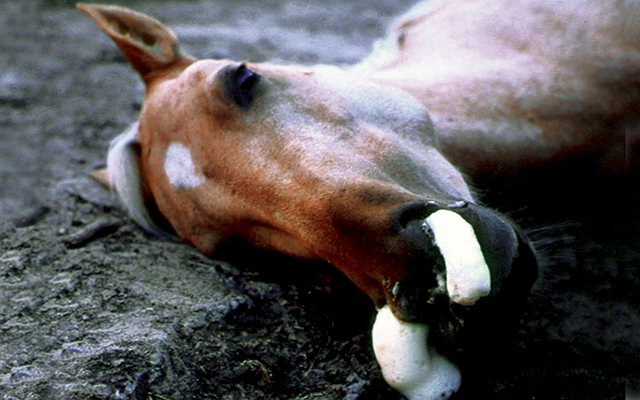African horse sickness (AHS) is a vector-borne viral disease of equidae (horses, ponies, donkeys and zebras).
Vector-borne refers to the fact that the virus can only be spread between horses by the bites of vector insects, in this case Culicoides midges, the same tiny flies that cause sweet itch. The disease is not transmitted by horse-to-horse contact or within inhaled droplets (like flu).
The mortality rate for AHS can be as high as 95% in horses without any immunity. There is no cure for the disease and treatment is aimed at controlling the clinical signs.
If AHS came to the UK, it would have devastating effects on horse welfare and major economic consequences for the industry. Yet how realistic is it that this exotic disease will threaten British horses?
Global changes
An outbreak of AHS requires the presence of certain climatic conditions and specific midge species. These conditions are consistently found in sub-Saharan Africa and the disease occurs there regularly, with outbreaks typically following warm and wet weather, when midge numbers increase.
The furthest north that AHS has occurred is Spain, with the last outbreak ending in 1990. The disease has never hit the UK, which is classified as “AHS disease-free” by the World Organisation for Animal Health (OIE).
News headlines have recently reported big changes in the global distribution of vector-borne viral diseases, however, including Zika virus fever in humans and bluetongue disease in livestock.
This is thought to be due to a combination of climate change — which allows new vectors to emerge or old ones to spread — as well as international transport, which allows the spread of the virus itself.
Bluetongue virus is very similar to AHS virus and both can be spread by the same midge species. A major bluetongue outbreak occurred in the UK for the first time in 2007, leading experts to suggest that both appropriate midge species and climatic conditions are now present in this country to support an outbreak of AHS.
Put simply, if it can happen for bluetongue, then why not for AHS?

What’s the risk?
The disease is controlled in South Africa using regular vaccination, however this is not licensed for use in the UK.
The primary focus of AHS control in the UK is on preventing the introduction of the virus in infected equidae. It is thought that the last outbreak in Spain was due to the importation of infected zebras from Namibia to a safari park. Zebras and donkeys can carry AHS without showing signs, putting them at higher risk of introducing the disease to new countries.
The OIE import regulations currently in place for all equidae are extremely stringent and the risk of introducing AHS in legally imported animals is very low. Additionally, AHS is among six diseases for which “high health high performance” (HHP) horses, which often travel internationally to compete, must have additional regular testing.
In theory, it is possible for AHS to reach the UK in an infected midge trapped within a plane. This risk is very difficult to calculate accurately, but is considered extremely low.
If an outbreak occurs in mainland Europe at any time in the future, however, it is possible that infected midges could be blown over to the UK. This almost certainly caused the spread of bluetongue to the UK.
New vaccine hope
British horses have no natural immunity to the AHS virus, so an outbreak among this “naïve” population could be catastrophic.
Preventing midges from biting horses is key to minimising disease risk, yet this is still largely impractical and further research is ongoing. Protection may be on the horizon, however. Researchers worldwide, including scientists at the UK’s Pirbright Institute, are currently working on new and more effective AHS vaccines. It’s vital that owners and vets recognise the signs of AHS and act immediately if infection is suspected. Visit tinyurl.com/africanhorsesickness for more information on what to look for.
Ref: Horse & Hound; 26 May 2016
